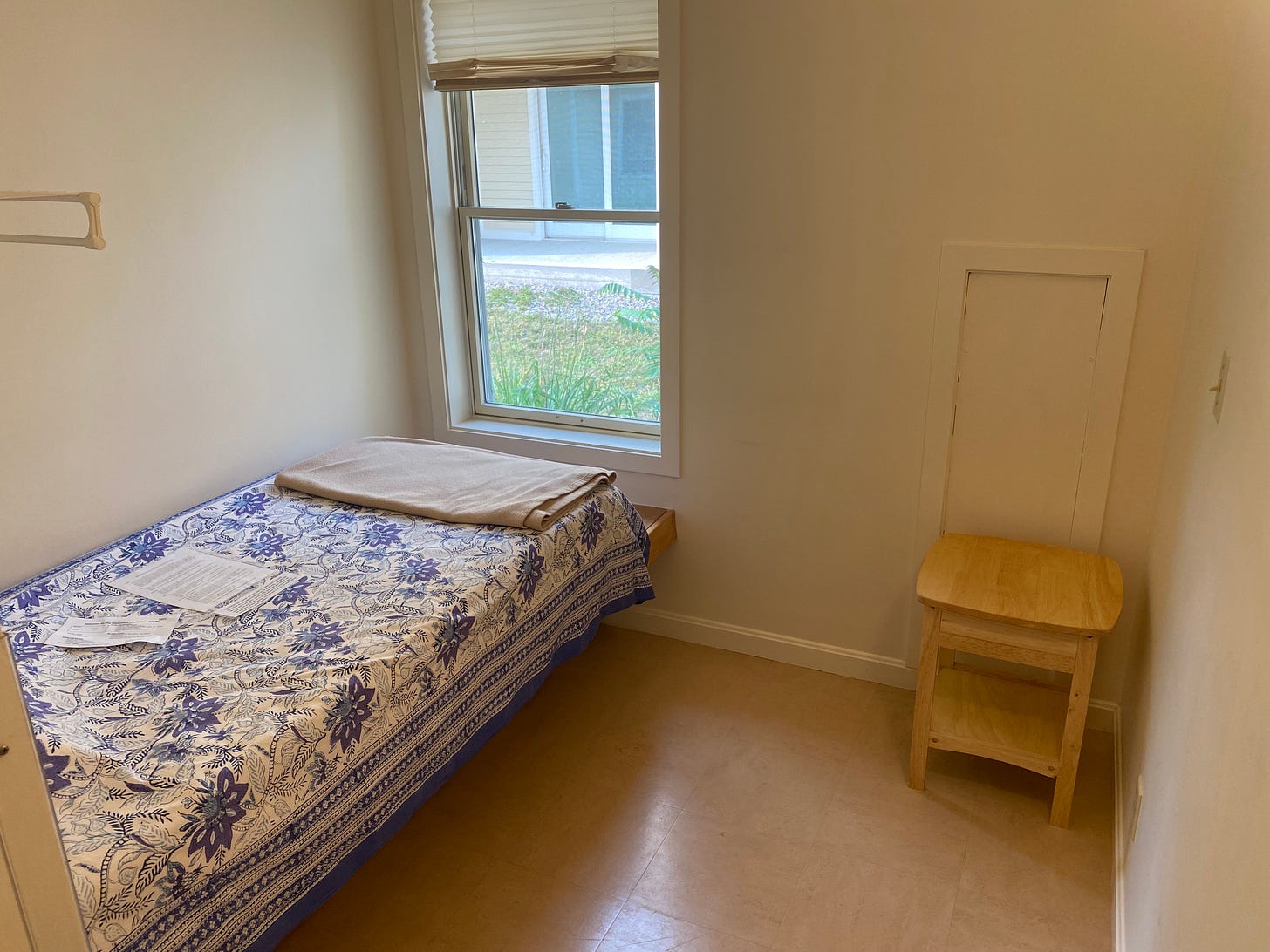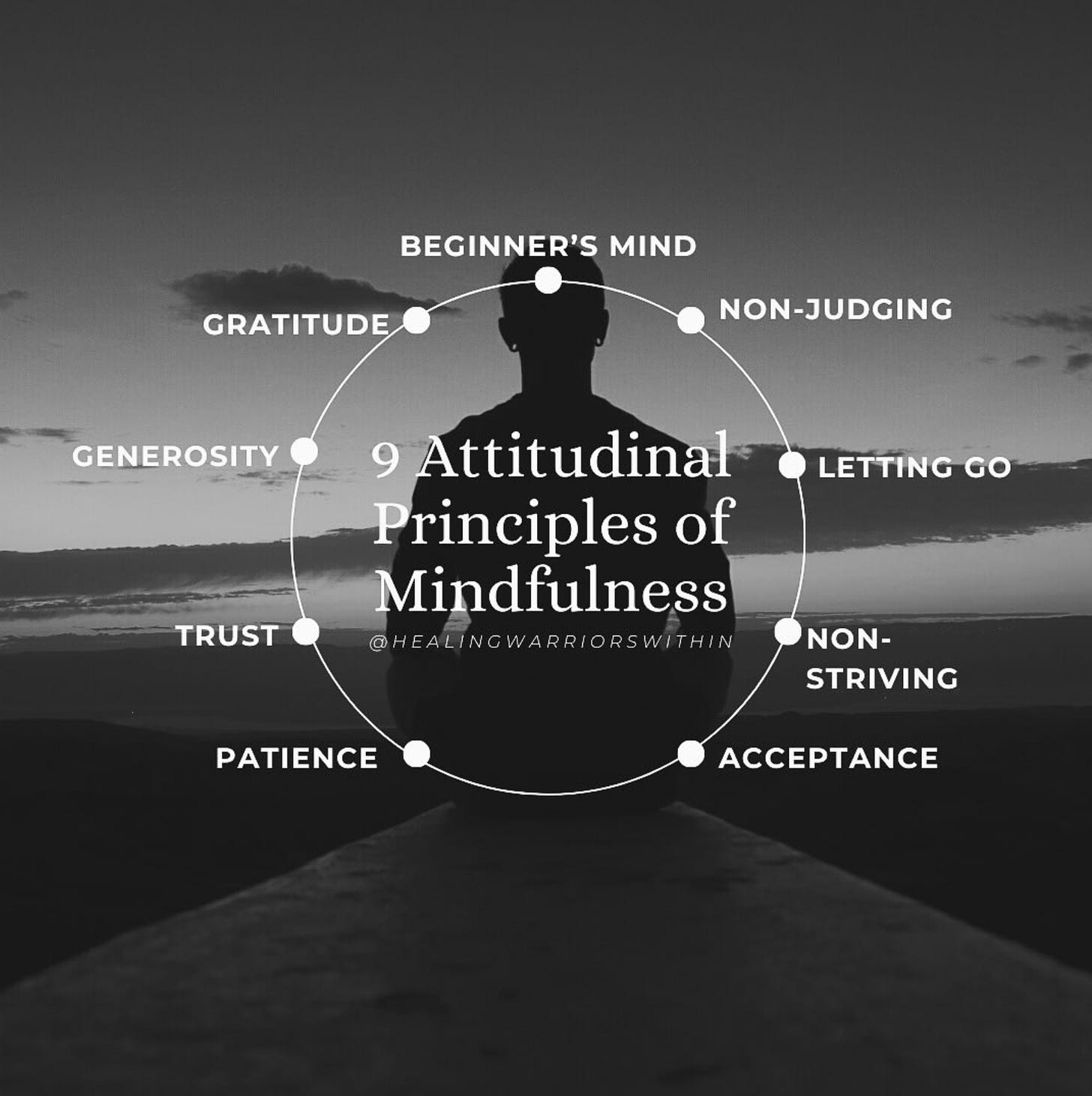A Mind That Watches Itself Transforms Itself: Lessons from a 10 Day Silent Vipassana Meditation Course
In this post I share the Buddhist principles underlying the Vipassana technique, the course schedule, and personal takeaways. For further reading,
shared his experience which offers more detailed descriptions of the day as well as his lessons learned. It’s a great read if you’re interested in the topic.I just returned from a 10-day silent Vipassana meditation course. For 10 days, there was no talking, no eye contact, no phones, no computers, no journaling, and no exercising (other than walks in nature). These rules are in addition to sīla (see below), which encompass three stages of the Noble Eightfold Path (beyond the scope of this post) and the five precepts, which we did practice.
The 5 precepts are:
1. to abstain from killing any being;
2. to abstain from stealing;
3. to abstain from all sexual activity;
4. to abstain from telling lies;
5. to abstain from all intoxicants.
Basically, sīla is a fundamental Buddhist practice that refers to morality, virtue, ethics, and discipline. The belief is that by practicing this strict code of discipline, students live for 10 days with wholesome intention, and intention is the precursor to thought which is the precursor to behavior.
However, sīla is just one side of a triangle that is foundational to Vipassana. The other two sides are samādhi, which is the concentration of mind, and paññā, which is the purification of the mind, also known as the wisdom of insight.
This being my first time doing this course, I didn’t have to honor three additional rules that “old” (i.e. previous) students were required to follow:
6. to abstain from eating after midday;
7. to abstain from sensual entertainment and bodily decorations;
8. to abstain from using high or luxurious beds.
Yes, old students slept on the floor. Speaking of which, before I turned in my phone (you must hand in your phone and any valuables to the front desk), I managed to take a picture of my room:
They said not to bring a computer, any reading material (i.e., kindle, books), or journals, so of course I did anyway (I see rules as guides to be re-written if they don't work for me ;). After all, I had an eight-hour train ride from Washington D.C. to Greenfield, Massachusetts, and I needed something to do. However I did lock up my computer and other items in my bag and give them the key along with my phone so I wouldn’t be tempted to access them during the course. However, about three days in, I found a pen in my bag that I forgot about. Me being me, I decided to write down some notes that I wanted to remember, except I didn’t have any paper to write on. So I tore open a Covid test box that I had (we were required to take two Covid tests there) and ripped toilet paper rolls in half.
Did this break the rules? Yes. However, if the intent of the rules was to facilitate morality, ethics, and discipline, well, I don't consider writing down key Dhamma concepts to remember to become a better practitioner as unwholesome. I’m also a living definition of self-discipline so I wasn’t too worried about that. I was also mindful not to just write, well, mindlessly—only doing it on breaks and not as a substitute for meditation. More than anything, I just wanted to capture important points from the nightly Dhamma talks. If that’s considered immoral or ill-intent, shoot me. It wouldn’t be the first time (or the second time, for that matter).
The Days
The days were long but they go by quick (at least they did for me). Here’s a general daily schedule:
4am: Wake up
430-630am: Meditate on one’s own
630-715am: Breakfast
8-9am: Group Meditation
9-11am: Meditate on one’s own
11-1145am: Lunch
1145am-1pm: Break (meditate, rest, or go for walk)
1-2:30pm: Meditate on one’s own
230-330pm: Group Meditation
330-5pm: Meditate on one’s own
5-545pm: “Dinner” (an orange—and banana if you’re lucky)
6-7pm: Group Meditation
7-830pm: Dhamma talk
830-9pm: Group Meditation
9-930pm: Questions for teacher (if any)
10pm: Lights Out
The first three days were spent focusing solely on the breath. Each day we narrowed our focus more and more so that on the fourth day it was sharp enough to begin learning the Vipassana technique.
Takeaways
This was an incredible experience. Meditation is a slower and more subtle change process than medicine work, but I love the practicality of it, as meditation is something you can do every day as a tool to sharpen the mind. I cannot think of a better way to improve one’s focus, strengthen the mind, and develop an acute sense of self than meditation. And anybody who says they don’t need more awareness is either a narcissist or living proof they lack it.
While there are many different goals of meditation, the main goal of Vipassana meditation is to purify the mind to see reality objectively. I know what you’re thinking, because I used to think the same thing: “I can already remain objective, so I’m good.” But what this really reflects, from a Buddhist perspective, is ignorance—not in the intellectual sense but as a misunderstanding of the nature of reality and one’s self.
The Nature of Reality
The gift of repetition is realizing that there isn’t any.
The nature of reality, in Buddhist philosophy, is one of impermanence. Constant and never-ending change. So, in the context of seeing reality for what it is, when a driver cuts you off on the road, for example, and you get so angry you start screaming, your blood pressure skyrockets, and you’re yelling at the top of your lungs, from a Buddhist perspective, that moment has already passed. The driver has already cut you off and now you’re clinging and reacting to the memory of it. You’re now seeing reality through the lens of anger or injustice or whatever rationale you want to ascribe, but you’re not seeing it objectively, which would be the driver cut me off, or, I’m driving.
As humans we are prone to emotional urgencies—cravings for what is pleasant and aversions to what is not. The mind seeks pleasure and it avoids pain. These desires are deeply rooted in the subconscious and reinforced through years of habit patterns. But through meditation, we can work to train the mind to forego these cravings and aversions by focusing on our felt sensations and responding with equanimity, thereby seeing reality for what it is with attaching judgment to it. More to come on this in a future article.
Living in Silence and Observing the Mind
When I checked into SEAL Team 4 as a brand-new guy, the leading petty officer sat me and another new guy down and said (among other things), “You guys have two ears and one mouth for a reason. Use that to your advantage.”
When you’re in a group conversation and you stop trying to find ways to interject, you begin to hear more of the conversation, more details. You hear more about other people through their verbal expression and see more through their nonverbal.
Living 10 days in silence worked the same way, except now you’re not listening to others’ conversations, you’re listening to your own. And…you pick up more details. You hear more verbal expressions in your mind, and “nonverbal” which, in this case, represent subconscious thoughts bubbling up to the surface. You begin to experience how your mind works rather than assume how you think it does—two very different things. Whenever I heard meditators tell me that they meditate to learn how their mind works, I used to think, “Well, I already know how my mind works.” Now I understand the difference between “knowing” how your mind works (or how you think it works), from an intellectual level, and knowing how it works from an experiential level. They are drastically different with life changing results. To be able to be in the experience of the mind while it transforms is an amazing, amazing, experience that cannot be expressed in words.
A mind that watches itself, transforms itself.
Sleep
I never realized that the more you meditate, the less sleep you need. I thought for sure I’d be tired waking up at 4am everyday but I wasn’t. Not one bit. In fact, I lay awake in bed for an hour after 10pm and often woke up at 3am or 330am because I couldn’t sleep anymore.
Silence
Not talking or making eye contact with anyone for 10 days wasn’t just easy, it was a breath of fresh air. I’m not naturally verbose, identify as an ambivert (in the middle between introvert and extrovert, but I favor introversion), and, well, have a select group of friends. I am very selective in the people I hang out with and spend my energy with and that is a very small number. When noble silence was lifted on day 10, I felt no desire to speak. In fact, I was kind of dreading it because I genuinely enjoyed not being sucked into mindless conversations or having to make small talk. In fact, I just went for a walk outside.
Letting Go
This was probably the most profound insight I had: experiencing the tremendous difficulty of letting go of a thought. It’s hard to express in words what this is like because any logical person might say, “Well, just let go. Just don’t think of it or think of something else.” And therein lies the problem. When you try to not think, you’re striving, which is the opposite of living in the present moment. When you think of something else, you’ve just replaced one thought with another, so you’re still engaging the conscious mind. If you’re thinking you’re not being, you’re doing
The goal isn’t to avoid unpleasant thoughts because that’s aversion, nor is the goal to think of only pleasant thoughts, because that’s craving. The goal is to simply be aware of such thoughts with calmness of mind, much like sitting on the side of the road watching traffic pass by, without trying to name the types or colors of cars or judge the drivers on their skills.
Conclusion
Overall, the course went by very fast for me. By day 8, I remember looking at my watch thinking, “Oh man, I’ve only got 7 hours left to meditate.” I’d actually love to do a longer 30 day course sometime but that’s tough with a family.
I could go on about lessons but I won’t for sake of brevity (this is already a loooong post). I’ll definitely share more lessons in future posts as they relate to wellbeing so if you’d like to stay informed, please consider subscribing below. I may also put together a short meditation course for beginners. If this is something of interest, please let me know in the comments below.








Nice report.
How would you respond to someone considering it but still skeptical about how to justify taking ten days away from "life?"
Thanks!